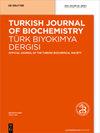小檗籽水提物对Wistar大鼠的毒性病理评价
IF 0.7
4区 生物学
Q4 BIOCHEMISTRY & MOLECULAR BIOLOGY
Turkish Journal of Biochemistry-turk Biyokimya Dergisi
Pub Date : 2014-01-01
DOI:10.5505/TJB.2014.83997
引用次数: 7
摘要
目的:黑皮草是西非地区广泛使用的一种治疗疟疾、腹泻和炎症的药用植物。本研究的目的是评价该植物种子水提物对Wistar大鼠的毒理学作用。方法:将24只健康动物随机分为4组,每组6只,分别以100、200、400 mg/kg体重的剂量口服牛油果种子水提物,以蒸馏水为对照,连续14 d。按标准方法测定肝肾功能指标及血液学和组织病理学指标,监测毒性。结果:通过植物化学筛选,发现其含有生物碱、糖苷、皂苷、甾体和单宁。各肾脏功能指标均无显著变化,但肝酶活性显著降低(P < 0.05),肝重比、血清总蛋白和球蛋白浓度显著降低。血清白蛋白和结合胆红素水平无显著变化,而血清总胆红素浓度显著升高(P < 0.05)。血液学分析显示,提取物对红细胞指数无显著影响,而白细胞计数及其差异显著升高(P < 0.05)。组织病理学研究进一步表明,所研究器官的细胞结构未发生畸变。结论:本研究证据表明,硝酸菌种子水提物具有以肝脏为靶器官的轻度选择性毒性。因此,作为口服药物,这种草药可能并不完全“安全”;应避免长期用药。本文章由计算机程序翻译,如有差异,请以英文原文为准。
Toxicopathological evaluation of Picralima nitida seed aqueous extract in Wistar rats
Objective: Picralima nitida is a widely used medicinal plant in West Africa for treating malaria, diarrhea and inflammation. The objective of this study is to evaluate the toxicological effect of aqueous seed extract of the plant in Wistar rats. Methods: Twenty-four apparently healthy animals were randomized into 4 groups comprising 6 rats each and orally administered with aqueous extract of P. nitida seeds at doses of 100, 200 and 400 mg/kg body weight with distilled water as control for 14 days. Specific liver and kidney function indices were assayed alongside haematological and histopathological analyses to monitor toxicity according to standard methods. Results: Phytochemical screening revealed the presence of alkaloids, glycosides, saponins, steroids and tannins. The extract had no significant effect on all kidney function indices assayed but caused a significant reduction (P < 0.05) in the activities of liver enzymes accompanied by significant decrease in liver to body weight ratio, serum total protein and globulin concentrations. No significant alteration was observed in the serum levels of albumin and conjugated bilirubin whereas the extract brought about significant increase (P < 0.05) in serum total bilirubin concentration. Haematological analysis revealed no significant effect on erythrocyte indices in contrast to white blood cell count and its differentials which were significantly elevated (P < 0.05) following extract administration. Histopathological studies further showed no distortion of cell structures in the studied organs. Conclusion: The available evidences in this study suggest that aqueous extract of P. nitida seeds exhibits mild and selective toxicity with liver as the target organ. Therefore, the herb may not be completely 'safe' as an oral remedy; and long term administration should be avoided.
求助全文
通过发布文献求助,成功后即可免费获取论文全文。
去求助
来源期刊
CiteScore
1.20
自引率
0.00%
发文量
0
审稿时长
6-12 weeks
期刊介绍:
Turkish Journal of Biochemistry (TJB), official journal of Turkish Biochemical Society, is issued electronically every 2 months. The main aim of the journal is to support the research and publishing culture by ensuring that every published manuscript has an added value and thus providing international acceptance of the “readability” of the manuscripts published in the journal.

 求助内容:
求助内容: 应助结果提醒方式:
应助结果提醒方式:


